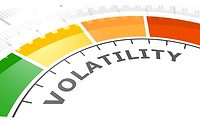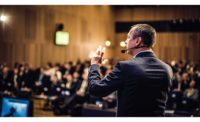2022 Voices from the Top: Adhesive & Sealant Industry Insights
To develop Voices from the Top, we reached out to key leaders at some of the top adhesive and sealant companies to get their insights on a number of issues.

(Photo courtesy of gremlin via gettyimages.com.)
Jeff Merkt, President and CEO, Bostik Inc.
Bostik, Arkema’s Adhesives segment, achieved almost €2.3 billion (approximately $2.5 billion) in revenue in 2021. An increase of 14.1% over 2020, this represented 24% of Arkema’s total revenue for the year. Arkema is ranked number 5 on the 2022 ASI Top 20.
Jeff Merkt, president and CEO of Bostik Inc., recently discussed challenges, opportunities, and plans for the future with Susan Sutton, editor-in-chief. Watch the ASI Insider video or read this partial transcript* to learn more.
Can you walk us through what you attribute Bostik’s success to, particularly given all of the challenges that we’ve seen over the past couple of years? How is the company faring and able to succeed?
Speaking broadly, our culture and long-term strategies have been our greatest drivers of success, and this has taken shape in many ways. Let’s start with agility and how our culture makes us agile. We have a really lean structure, which helps us to make decisions and take actions quickly. Our culture is also one of empowerment in which people are encouraged to act when appropriate. This enables us to adapt to changing environments.
We live in a world in which business, economic, social, and political conditions have been changing frequently. Being able to respond to those changes quickly means we can meet customer needs fast and effectively. I might add that empowering people to make decisions is also a powerful way to develop and retain top talent. To succeed in today’s world, we must be able to rapidly adjust to a number of factors, changes in technology trends such as the increasing importance of sustainability, changing of the regulatory framework, and the volatility of the global markets we serve.
We can all agree that the recent years have tested every company’s fragility, and one challenge we faced was the need to start up a new factory in Japan producing adhesives and sealants for that marketplace during the pandemic. Our experts, who normally would associate the startup of a factory, were not able to join because Japan was locked down. So we had to collaborate at a very high level. You can imagine the experts from France and North America were getting up at incredible early hours or staying up incredibly late.
We saw innovation happen. We introduced the use of smart glasses. We did some online training in different languages because some of the experts were French, some of the experts were Spanish, some of the experts were Americans. And then that language was translated so that the operators, who normally would have someone physically there—it’s so much easier to communicate—really understood what we were trying to do. We had a great startup of that factory.
Another factor that drives our success is consistency. The Arkema Group and Bostik had the same long-term strategy for many, many years. That consistency during this dynamic period of time has really helped every employee know what the long-term goal is, and then they can adjust how to behave or act.
A hugely important thing as part of Arkema and Bostik is customer intimacy. Having a keen, in-depth understanding of our customers is essential to one of our long-term strategies, which is to pursue innovation and drive a more sustainable world. Knowing our customers, their needs, their aspirations, what’s happening in the markets that they face allows us to sharpen our innovation focus in a way that delivers on the real needs for them. In other words, our customers are at the center of our innovation strategy, so we continually create adhesives and technology pipelines that address sustainability and the other challenges our customers face by having the customer at the center of our innovation strategy.
Another factor in our success is the global and local balance. Bostik’s a part of Arkema; it’s a large group. We have the benefits of being a part of a large group, and the organization that comes with it. At the same time, we work hard to be a nimble local company, and this allows us to deliver value to all of the customers we serve. This local balance is something we work really hard to maintain.
What are some of the challenges and perhaps some opportunities you’re seeing for the adhesive and sealant industry throughout the rest of this year and into the beginning of 2023?
It goes without saying that the supply chain, which we’ve experienced for many years now, and geopolitical disruptions have created enormous challenges for the adhesives and sealants industry. We expect this to continue for a long time. Like most challenges, though, there are also opportunities for suppliers that are agile and adapting to those changes in an effective way.
Another major trend that will continue is the acceleration in the demand for sustainable solutions. I really believe this. It’s a trend in every industry we serve, be it hygiene or packaging, housing or transportation. Sustainability trends have clear consequences in our adhesives. In particular, we look at the raw materials we use to formulate the adhesives and sealants. We’re generally looking to increase the amount of bio content or look at materials that are coming from a recycled source. We’re also looking at and making sure that the raw materials we use in our adhesives and sealants don’t have any substances of concern, because the regulatory marketplace is definitely changing rapidly as well. That’s a key success factor, to be able to understand those regulatory changes and then adjust your raw materials accordingly.
One of the things that’s really important is to develop materials that enable other sustainable benefits. For example, we’re working on adhesives that allow or enable things like lighter vehicles so that the energy consumption of the vehicle, be it a gas engine or an electric vehicle, goes down. We also believe in the fact that people will want to develop products that have longer useful lives, so we’re working on adhesives that allow durable goods to have longer, useful lives. This is really an important area of development for Bostik.
One thing we’re also doing is we’re trying to work more intimately with our customers to help enable them to find more sustainable solutions. This means the adhesives enable them to put more natural materials into their product, or the adhesive allows them to manufacture something in a more efficient way, using less energy or creating less waste in the manufacturing process. This enabling umbrella or concept is really key because adhesives pull everything together. We’re also developing materials that allow people to make products more reusable or recyclable or compostable. These are key themes or pillars that we’re formulating our long-range R&D programs on.
Can you talk a little bit more about Bostik’s plans for the future to address some of the challenges you talked about?
I spoke earlier about customer intimacy. It’s amazing to me after 30 years in the industry, how important it is to keep mentioning to everyone that we need to know our customer. It’s also important to know that as part of Arkema, corporate social responsibility is a key theme, a very important dynamic for us.
Knowing our customer means that we understand what they’re trying to do, what they need in terms of adhesives, what the trends are happening in the markets that they serve. This deep understanding of our customer is going to allow us to continue to meet their needs, in particular in the area of sustainability that I mentioned earlier.
The other factor I mentioned is CSR, and it may not seem like that’s an obvious factor in meeting future challenges, but if you look at it in broad terms, it already is helping us think about our environmental footprint in terms of us reducing the amount of water we use in our sites, the energy we use, the greenhouse gases that we emit. Pursuing efforts to become more sustainable allows us also to bring real value to our customers because they are worried about scope three. They want us to be reducing the scope three in the products that we buy, even though sometimes adhesives are a small part of the total article.
Our CSR program is really bracketed by five key pillars or five key areas. As part of the group of Arkema, we’re focusing on making lighter weight materials, high-performance materials that allow us to enable new energy formats. Batteries and electric vehicles are really a key opportunity not only for adhesives and sealants but also for some of the polymers that Arkema produces. Materials that support effective use of natural resources—water is a key theme for the world. Adhesives are used in the creation of filters that allow people to take greywater and make good water for drinking or for bathing.
Advanced materials that support advanced electronics is really key. I mean, the adhesives are so critical to the continued trend of people being dependent on electronics. Finally, materials either from Arkema or adhesives and sealants that allow homes or buildings to be more energy efficient or more comfortable, quieter, or have better air management. These solutions are things that we believe will make the world a more sustainable place and are really the key themes for Arkema for the next five years.
For more information, visit www.arkema.com and www.bostik.com.
*edited for length and other factors
View Other Participants:
Looking for a reprint of this article?
From high-res PDFs to custom plaques, order your copy today!






